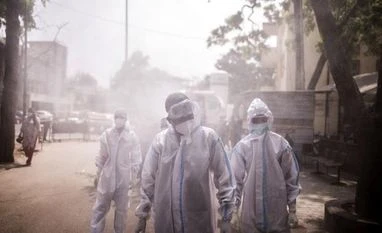The study published by Indian SARS-CoV-2 Genomic Consortia along with the scientists of the Cambridge University in the UK in the bioRxiv, an open access preprint server, “Extensive vaccination will likely protect against moderate to severe disease and will reduce the transmission of B.1.617 given the in vitro neutralisation data we and others have presented.”
The B.1.617 variant first emerged in Maharashtra towards the end of 2020 and has spread throughout India and to at least 40 countries. The Indian mutation, the study says, has contributed to the epidemic wave in India. It found that the progression to severe disease and death was low in all studies.
The study titled SARS-CoV-2 B.1.617 emergence and sensitivity to vaccine-elicited antibodies said that in absence of published data on transmissibility, it is predicted that the variant would have increased transmissibility even among those who are vaccinated or have pre-existing immunity. “It is unclear whether B.1.617 variants will prove more transmissible than B.1.1.7, also circulating in India and now globally dominant.”
“This spike confers modestly reduced sensitivity to BNT162b2 mRNA vaccine-elicited antibodies,” the study said referring to the Pfizer vaccine.
The study found that health workers at a single tertiary hospital vaccinated with the ChAdOx-1 vaccine (the Oxford-Astra Zeneca vaccine) had breakthrough infections, which were predominantly the Indian variant. Scientists said this could be because of the prevalence of the variant in the community or it might simply reflect transmission between health care workers. “The data nonetheless raises the possibility of a transmission advantage of B.1.617 in vaccinated individuals,” the study said.
The research group has also studied a sub-lineage of the variant, which has three strains - L452R, E484Q, and P681R. The last one of these (P681R), virologists said can lead to increased tissue damage and more pathogens.
The scientists also noted in their findings that this particular variant was found increasingly more frequently during the ongoing outbreak in Delhi.
The study has been authored by Ravindra K. Gupta of the Cambridge Institute for Therapeutic Immunology and Infectious Diseases along with researchers from the National Centre for Disease Control, India; CSIR Institute of Genomics and Integrative Biology in India, University of Tokyo, Japan among others.
To read the full story, Subscribe Now at just Rs 249 a month
Already a subscriber? Log in
Subscribe To BS Premium
₹249
Renews automatically
₹1699₹1999
Opt for auto renewal and save Rs. 300 Renews automatically
₹1999
What you get on BS Premium?
-
Unlock 30+ premium stories daily hand-picked by our editors, across devices on browser and app.
-
Pick your 5 favourite companies, get a daily email with all news updates on them.
Full access to our intuitive epaper - clip, save, share articles from any device; newspaper archives from 2006.
Preferential invites to Business Standard events.
Curated newsletters on markets, personal finance, policy & politics, start-ups, technology, and more.
Need More Information - write to us at assist@bsmail.in
)